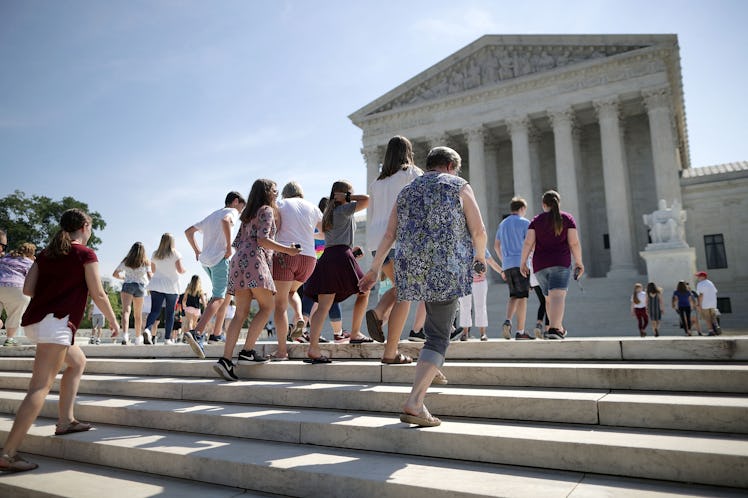
The Dissent In The Supreme Court Crisis Pregnancy Center Case Gets To The Core Of The Issue
The Supreme Court of the United States released its decision on Tuesday, June 26, and this quote from the dissent on the crisis pregnancy center (CPC) ruling is telling. Justice Stephen Breyer wrote the dissent for the court, which voted 5-4 in favor of the CPCs. The decision was made on the case of NIFLA v. Becerra.
The anti-abortion group National Institute of Family Life Advocates, or NIFLA, took on California Attorney General Xavier Becerra over the state's Reproductive Freedom, Accountability, Comprehensive Care, and Transparency Act (also known as the "FACT Act"). The law required care facilities to disclose to patients their full range of options, including information on abortion and other state-funded free or low-cost options.
In his 14-page dissent, Breyer, one of the court's four liberal justices, got to the heart of the issue: the First Amendment right to free speech posed in this ruling. He wrote:
If a state can lawfully require a doctor to tell a woman seeking an abortion about adoption services, why should it not be able, as here, to require a medical counselor to tell a woman seeking prenatal care or other reproductive healthcare about childbirth and abortion services?
"We have previously noted that we cannot try to adjudicate who is right and who is wrong in this moral debate," wrote Breyer. In his argument, he pointed to several precedents set by other court cases regarding abortion and added that California also requires medical professionals to inform women diagnosed with breast cancer of their treatment options.
But in passing a judgment on the issue of abortion, he added, the same standard of free speech should be applied evenly. He continued,
[A] Constitution that allows States to insist that medical providers tell women about the possibility of adoption should also allow States similarly to insist that medical providers tell women about the possibility of abortion.
He went on to explain how the law impacts low-income women who may stand the most to lose by not being informed of their access to those options, writing,
That those with low income might lack the time to become fully informed and that this circumstance might prove disproportionately correlated with income is not intuitively surprising. Nor is it surprising that those with low income, whatever they choose in respect to pregnancy, might find information about financial assistance particularly useful.
Breyer was joined in his dissent by Justices Elena Kagan, Sonia Sotomayor, and Ruth Bader Ginsburg.
CPCs, often called "pregnancy resource centers" by anti-abortion advocates and "fake women's health centers" by critics, are not licensed healthcare facilities. Still, they can provide counseling to pregnant individuals about their options. Because these CPCs are usually funded by anti-abortion groups, though, they may lean conservative and favor the option to carry a pregnancy to term. That's what the FACT Act sought to balance: That any facility serving pregnant women in this capacity would need to provide information on abortion services available to them as well. To that end, the law mandated facilities to posts signs in different languages that would inform patients of those alternatives. The law also required unlicensed facilities to disclose their status as such.
As the SCOTUS decision reverberated beyond the courthouse doors, many began to weigh in. In a statement obtained by Elite Daily, the Democratic National Committee (DNC) called the decision Tuesday "a brazen assault on women's rights and health." It added,
Once again, Republicans and their allies are turning back the clock and telling women what they can and can't do with their bodies. Democrats believe that women have the right to make their own decisions about their reproductive health. We believe in making it easier, not harder, for women to get the information they need when making these decisions. We believe that no woman should be denied her basic rights based on income, race, or geography. And we will fight tooth and nail to protect a woman's constitutional right to an abortion.
Online, groups and individuals alike took to social media to express their sentiments about the sweeping decision.
The SCOTUS decision on NIFLA v. Becerra was one of several to be released on Tuesday. The court also gave its ruling on President Donald Trump's "travel ban."
The NIFLA decision, while seen for pro-abortion advocates as another nail in the reproductive rights coffin, is largely regarded as a victory for anti-abortion groups.
The ruling, too, could have bearing on other states looking to pass similar laws, or anti-abortion groups looking to challenge existing laws.